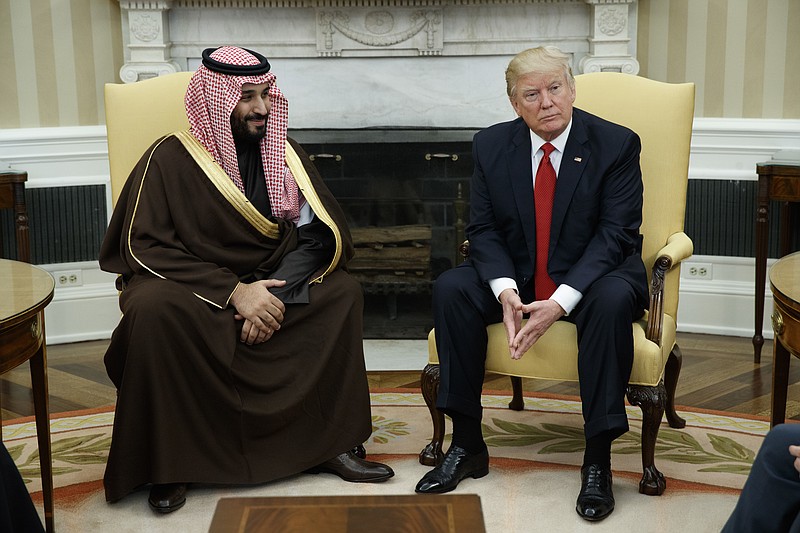Memo to: President Trump
From: The U.S. ambassador to Saudi Arabia (if we had one)
Subject: Saudi crown prince visit
Mr. President, in advance of the visit by Saudi Crown Prince Mohammed bin Salman, aka MBS, I want to share some thoughts:
It's only a matter of time before King Salman turns over the reins of power to MBS, who's already the effective ruler. MBS is not a democrat, nor is he interested in promoting democracy. He's a modernizing autocrat. The most we can expect from him is the modernization of Saudi Arabia's economy and religious/social structure, but given how badly the country has stagnated from years of tentative reforms, this is deeply significant.
MBS is definitely bold. I can think of no one else in the ruling family who would have put in place the profound social, religious and economic reforms that he's dared to do - and all at once. But I can also think of no one in that family who'd have undertaken the bullying foreign policy initiatives, domestic power plays and excessive personal buying sprees he's dared to do, all at once. They are two halves of the same MBS package. Our job: help curb his bad impulses and nurture his good ones.
His potential is vast. MBS is trying to forge a societal transformation in Saudi Arabia. Call it "one country, two systems." For those who want piety, the mosque, Mecca and Islamic education, they'll all be available and respected. But for those who want modern education and a more normal social life between men and women - and access to Western, film, music and the arts - those too will be available and respected. No more religious domination. That is huge.
Because when the Saudi ruling family - feeling the need to demonstrate greater piety after the 1979 takeover by Islamist zealots of the Grand Mosque in Mecca - took Sunni Islam down a much more puritanical path, right when Iran's ayatollahs did the same with Shiite Islam, they changed the face and culture of Islam. And it was not for the better. The Saudis closed all cinemas, banned concerts and fun, choked off trends for women's empowerment and modern education, and spread an anti-pluralistic, misogynist, anti-Western form of Islam far and wide that created the ideological and financial underpinnings of 9/11, ISIS, al-Qaida and the Taliban.
Just think of the dollars we've spent countering Islamic extremism since 9/11. It's trillions. Yet we now have a Saudi leader who is not just talking about but actually lifting the ban on women driving; freeing women to go to concerts by Western and Arab rock stars, join the military and more easily start businesses, while sharply curbing the power of the religious police and clerics in daily life; importing Western-style learning systems, reopening cinemas and vowing publicly to bring Islam back to its "moderate" origins; and, most recently, lifting the law that a Saudi woman who sought a divorce, and went to live with her parents, had to return to her husband if he demanded.
If Saudi women are empowered (which will be fully true only when the rules of "male guardianship" over them are lifted), and the kingdom becomes a more normal, connected and productive society, Saudi Islam will naturally become more moderate and inclusive. Given how Saudi Arabia sets the tone for Islam globally, this will isolate extremists and empower moderates everywhere. Again, huge.
To pull this off requires extraordinary leadership by MBS, and an extraordinary team. Alas, here MBS has issues. For starters, he comes from the poorest wing of the ruling family; his father was only governor of Riyadh and was known for being uncorrupted. As a result, MBS grew up with a lot of resentment and disdain for his lazy cousins, who got obscenely rich, along with the big merchants close to them.
On the management side, MBS' team is too small and contains a couple of minister-bullies close to him who are in way over their heads and who bring out his worst instincts and offer terrible advice - some of which led to his failed overreaches in Yemen, Lebanon and Qatar. And while MBS is a creative reformer, he has a fierce temper. Most of his ministers are afraid to challenge him or give him the candid, caring advice he needs.
Those liabilities could undermine all his reforms. So, we need to be regularly engaging with him on all these issues - with wise counsel. But Rex Tillerson is not respected in Riyadh, we have no permanent assistant secretary of state for Near Eastern affairs, and no ambassador. You need to appoint a James Baker or Dave Petraeus as your special envoy to the Arab Gulf who can help MBS defuse Yemen, end the feuds with neighbors and focus all his energies on building a Saudi Arabia that is thriving at home and admired by its neighbors. That's the best bulwark against Iranian expansion.
If I may, President Trump, MBS is a young man, and two-thirds of Saudi Arabia is under 30. They look to America for more than just weapons. They look to us as an example. They watch what we model - so it is more vital than ever that we continue to model the rule of law, respect for institutions, tolerance and pluralism. A special U.S. envoy to Saudi Arabia is necessary now, but keeping America a special example is even more important. You get my point.
Please heed this message.
Your ambassador to Saudi Arabia - if you had one.
The New York Times
